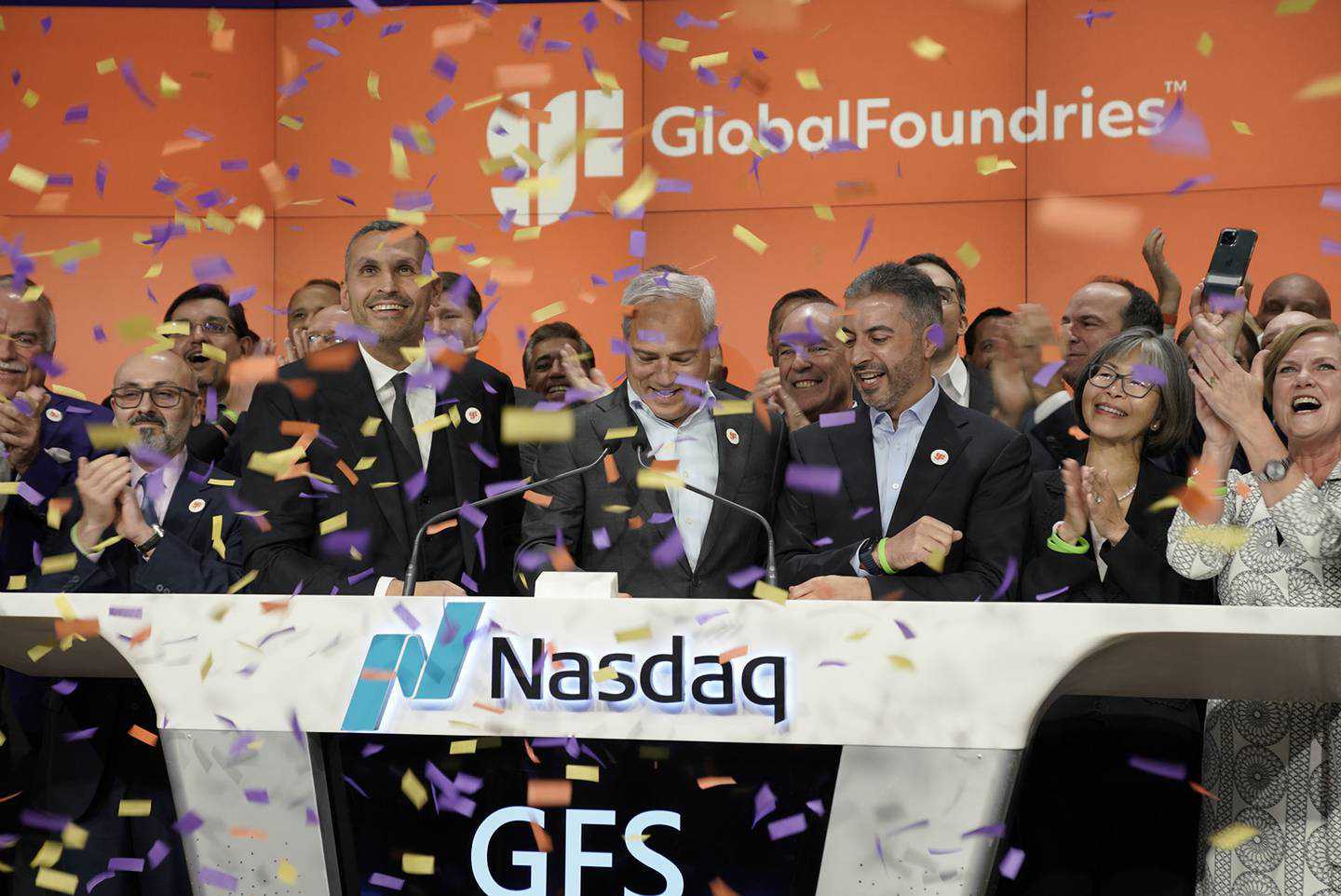Mubadala-backed GlobalFoundries raises $2.6bn in US IPO

GlobalFoundries, the world’s third-largest semiconductor manufacturer owned by Abu Dhabi’s Mubadala Investment Company, raised nearly $2.6 billion in its initial public offering in the US amid strong demand from investors.
The New York-headquartered company set the IPO price at $47 per share, at the higher end of its targeted price range after marketing the shares for $42 to $47. This gives the company a market value of nearly $26 billion.
The company's shares began trading on the Nasdaq Global Select Market on Thursday under the ticker symbol ‘GFS’.
“It is the big day for GlobalFoundries, Mubadala and Abu Dhabi. We created GlobalFoundries 12 years ago because we felt it was important to invest in the technologies of tomorrow,” Khaldoon Al Mubarak, chief executive and managing director of Mubadala Investment Company, told The National.
“GlobalFoundries’ semiconductors are vital for many of the technologies we rely on every day … including the chips in mobile phones, the smart devices in your home and the safety features in your car,” said Mr Al Mubarak.
GlobalFoundries, which aims to increase its production capacity by nearly 50 per cent in next three years to address the Covid-induced global chip shortage, sold nearly 55 million ordinary shares representing almost 10 per cent of its share capital. More than 30.2 million shares were offered by the semiconductor manufacturer and more than 24.7 million were offered by Mubadala.
Mubadala has also granted the underwriters a 30-day option to purchase up to an additional more than 8.2 million ordinary shares at the public offering price, less underwriting discounts and commissions.
The IPO was led by Morgan Stanley, Bank of America, JPMorgan, Citigroup and Credit Suisse Group.
The listing in New York is a landmark transaction for a technology company backed by a sovereign wealth fund from the Middle East.
GlobalFoundries was established in 2009 after Mubadala acquired the semiconductor manufacturing assets of Advanced Micro Devices. After the acquisition, GlobalFoundries started making chips for other companies in addition to AMD.
In October 2014, GlobalFoundries acquired International Business Machines’ microelectronics division with manufacturing facilities in New York and Vermont, in a deal which added to its global footprint.
The company employs more than 15,000 people globally, has around 10,000 global patents and serves more than 200 customers worldwide, including the US government.
“Going public brings not only the new disciplines that come with an IPO but also a sign of the stature, stability and potential of GlobalFoundries,” Mr Al Mubarak said.
The listing of GlobalFoundries is the third largest on a US exchange this year by deal size. South Korea's e-commerce company Coupang’s had a $4.5bn IPO and Chinese ride-hailing company DiDi Global’s listing raised $4.4bn, according to data compiled by Bloomberg. This doesn’t include blank-cheque and similar companies.
Technology megatrends, such as internet of things, 5G, cloud, artificial intelligence and next-generation automotive, are reshaping the semiconductors industry - a market that is expected to grow to more than $1 trillion by the end of this decade, from close to $500 billion this year, according to VLSI Research.
“Semiconductors have become ubiquitous, powering a broad range of applications from consumer devices to enterprise and industrial applications … semiconductor innovation is essential to the growth and development of many parts of the technology ecosystem,” GlobalFoundries said.
Since 2009, GlobalFoundries has invested more than $23bn to build a global manufacturing footprint with multiple facilities spread across the US, Germany and Singapore.
The company’s platforms are well-positioned in five key growth markets - smart mobile devices, home and industrial internet of things, communications infrastructure and data centres, automotive and personal computing.
Currently, there are only five foundries of significant scale – TSMC, Samsung, GlobalFoundries, Semiconductor Manufacturing International Corporation and United Microelectronics Corporation.
Collectively, these five entities accounted for the vast majority of worldwide foundry sales in 2020, according to Gartner. A semiconductor foundry, commonly called a fab, refers to a factory where devices like integrated circuits are manufactured.
Tags :
Previous Story
- Abu Dhabi climbs in global smart-city ranking to...
- Khalifa Fund connects Emirati entrepreneurs to manufacturers in...
- Alpha Dhabi Holding's third-quarter net profit surges on...
- SoftBank-backed Tier raises $200m in funding round
- Aldar plans to recruit 1,000 Emiratis by 2026
- Abu Dhabi unveils 'virtual' business licences to boost...
- Adia leads Indonesia's GoTo pre-IPO funding with $400m...
- Etihad Airways to restart flights to Sydney on...